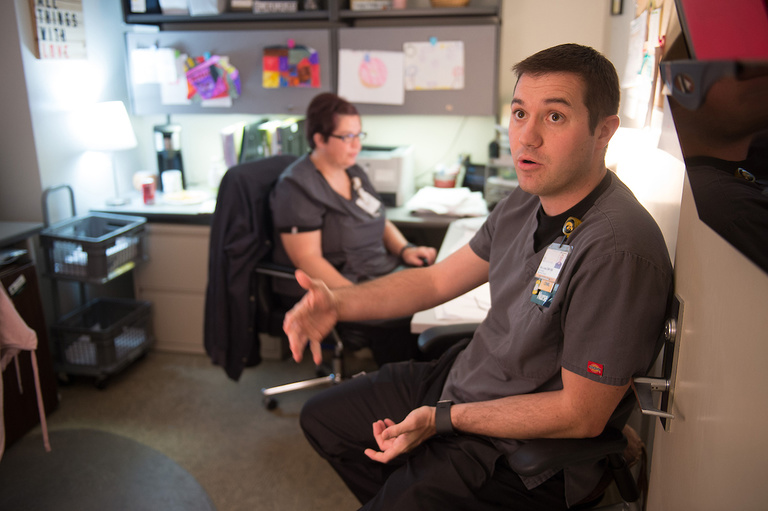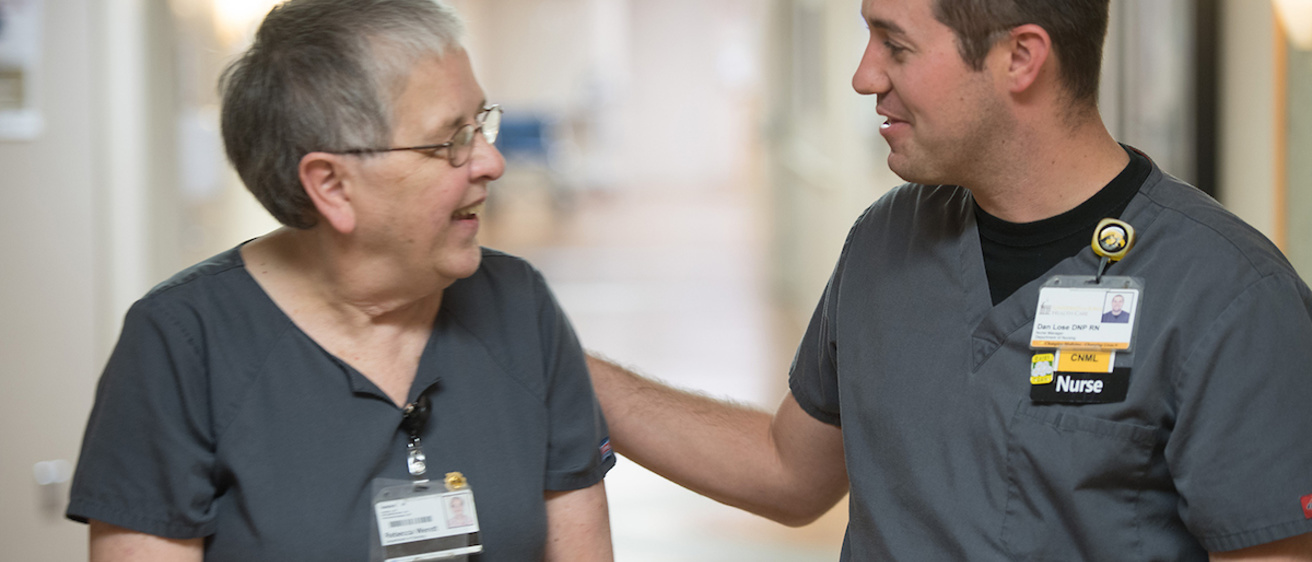On one of the busiest patient floors at University of Iowa Hospitals & Clinics, Dan Lose, a 2016 doctor of nursing practice graduate of the UI College of Nursing, oversees a staff of 140, an annual budget of $10 million, and a daily churn of patients that puts his medical and management skills to the test.
In many ways, Lose is the embodiment of a new generation of nurses: health care professionals who are extremely skilled at patient care, but also key health care leaders and innovators who play a pivotal role in advancing health care, research, and technology.
“Health care is changing and nurses are at the forefront of that change,” says Lose, a native of Rochester, Minnesota, who also completed his BS in nursing at the UI College of Nursing. “Nurse leaders bring the perspective of patients and front-line staff to the decision-making table, and I believe that our input is imperative.”
The College of Nursing will celebrate its 120th anniversary with a series of events Oct. 11–14. For more information about the celebration or to register to attend, visit the college’s website.
Since its inception in 1898, the UI College of Nursing has been focused on educating the next generation of nurses. Today, as the profession regionally and nationally struggles to meet the needs of a growing patient population with more complex health needs, college leaders say they are at the forefront of creating new programs and conducting meaningful research that will empower nurses to take on new management and leadership roles in hospitals and clinics.
“The University of Iowa College of Nursing has an impressive history of leadership in nursing education and research,” says Julie Zerwic, the eighth dean of the college. “As we move forward, we constantly seek out new education methods that will ensure that our students have the skills they need to lead interdisciplinary health care teams to tackle future health challenges.”
Zerwic and others familiar with the college’s history say that it has long been a place where innovation has been emphasized—both in research and in teaching that improves student success.
“Since the 1970s, there has been a significant push at the college to involve more nurses in research, and this is because college leaders saw research as a way to advance nursing science and the nursing profession as a whole,” says Elizabeth Swanson, who received both her bachelor and master of nursing degrees from the college and who served in many roles within the college, including associate professor and administrator, before her retirement this year.
The University of Iowa is the only school in Iowa to offer a nursing PhD program, the goal of which is to educate nurse scientists who can find new solutions to symptom management and health education and promotion.
The college is also a national leader in evidence-based nursing, in which nurses use research to safely change or update practices, says Ann Marie McCarthy, professor and associate dean for research and scholarship at the college.
“Nurses from the college and UI Hospitals & Clinics developed the Iowa Model of Evidence Based Practice to support changes in health care practices to benefit patients,” says McCarthy. Some examples of this approach include the creation of a “distraction in action” tablet app to help children relax during difficult medical procedures, as well as recent changes in elder care at UI Hospitals & Clinics, including a reduction in the use of physical restraints on patients in acute care and fall prevention education for older adults.
In addition to research, the college also leads the way in nursing education trends, says McCarthy. Today, the college offers multiple advanced degrees, including master degrees, doctor of nursing practice degrees, and PhD degrees. The doctor of nursing practice degree is the newest program offered and includes focuses in family medicine, psychiatry, and anesthesiology. The UI is the only school in Iowa to offer a nursing PhD program, the goal of which is to educate nurse scientists who can find new solutions to symptom management and health education and promotion.
This emphasis on research to solve problems and keep patients safe, combined with the creation of new, advanced nursing degrees, has resulted in nurses playing a more central role in health care decisions and management, says McCarthy.
“Early on in the history of nursing, nurses were seen as people who would do their work in tandem with a doctor, but that’s not necessarily the case anymore,” says McCarthy. “Today, nurses can open their own practices and work independently of a doctor. It’s always been a great degree, but at the college we’re seeing a new level of student interest in the field, and I think that reflects the exciting and wide range of possibilities that a career in nursing offers. You can really chart your own path.”
Another driving force behind the evolution of nursing education at the UI, McCarthy says, was a 2010 report titled The Future of Nursing: Leading Change, Advancing Health published by the Institute of Medicine and the Robert Wood Johnson Foundation, which advocated for strengthening the nursing profession through advanced education. The report was released about the same time as the Affordable Care Act went into effect—when there was a need to increase the number of nursing professionals in the U.S. to meet new patient demands.
When the Future of Nursing report was released, former College of Nursing Dean Rita Frantz took a leadership role in implementing recommendations statewide, creating an action team to oversee the process and seeking the help of college experts. Frantz and deans from other nursing colleges wanted Iowa to lead the health care movement advocated in the report, and they acted quickly to implement new educational programs to reflect the report’s recommendations.
Lose says he was lucky to work with Frantz on the implementation process.

—Dan Lose
“That report is probably one of the big reasons I am where I am today,” Lose says. “It made everyone realize the big changes ahead in health care and it pushed nurses to be at the forefront of that change. People still talk about ‘the report’ eight years later. It continues to have a profound impact on nursing education and the profession as a whole.”
Lose says he feels fortunate to have been able to enter the doctor of nursing practice program and tailor it to his areas of interest. When he wanted to learn more about health care finances, his professors helped him set up internships with Principal Financial in Des Moines and with the CEO of a local hospital.
“I’m glad I went to UI for my nursing degrees because I learned from world-renowned faculty who provided me with valuable opportunities to learn and grow as a nurse,” says Lose.
April Prunty, a 2009 graduate of the college’s MS of nursing program and current student in the college’s PhD program, says she is also thankful for her UI College of Nursing experience. Today, Prunty co-directs the college’s Nursing Clinical Education Center, which houses high-fidelity mannequins to simulate sophisticated nursing care scenarios, including childbirth, strokes, and heart attacks.
“A big part of the reason I came back was because of the wonderful experience I had as a student at the UI College of Nursing,” says Prunty. “Although clinical simulation wasn’t used to the same degree when I was a student, the education I received at Iowa was top-notch and when I graduated I definitely felt like I could conquer the world.”
Prunty says she is proud of the efforts the college makes to ensure students have the best education possible, including regular investment in new medical and teaching technology and classroom upgrades. The college is currently undergoing an $11.8 million renovation, which is expected to be finished in 2019.
“Our nursing learners are changing,” says Prunty. “This is a generation of students who were raised with technology—with iPads and laptops—and so when they come into the simulation lab, they are already very comfortable with the technology that is in use there. At the college, we are constantly looking at how to adapt our curriculum to better serve student demand.”
Undergraduate nursing student Josie Thomas of Council Bluffs, Iowa, says she came to Iowa for her nursing degree because she knew that she would receive support from professors and fellow students, and because she was aware of the college’s excellent reputation.
Every year, US News & World Report ranks the college among the best in the nation for nurse education. This year, the college’s nursing service administration program was ranked the second-best in the nation, and the college’s clinical nurse leader degree and adult/gerontology acute care program ranked seventh and ninth, respectively. Many more of the college’s programs are ranked within the top 20 nationally, including its nurse anesthesia program, pediatric nurse practitioner program, doctor of nursing practice program, and family nurse practitioner program.
“From day one, I have felt super-loved and super-cared about,” says Thomas, who visited the college when she was still in high school. “What I really like about the College of Nursing is that professors don’t just teach you something to get you through the course, they really want you to learn all that you can so that you can succeed. The amount of support that students get from faculty is amazing and I don’t take it for granted at all. I feel very fortunate to be getting my degree at Iowa.”
Looking forward, Zerwic says she plans to continue focusing on student learning and success to ensure that the health care needs of the state and the nation are met. She is particularly interested in using active-learning approaches that allow students to work collaboratively, which simulates the work they will do as members of interdisciplinary health care teams. Recently, the college recruited UI theater students to play the roles of sick patients so nursing students could hone their skills. Zerwic says this method of simulation training has been a success and she’s excited to expand such efforts to ensure all students get a chance to participate.
“I’m excited to be at the UI College of Nursing at a time when the expertise that nurses bring to the health care field is being recognized and validated in so many exciting ways,” says Zerwic. “I couldn’t be more proud of our nursing students and alumni, who are dedicated to patient care and who break new ground in health care leadership and research every single day.”
